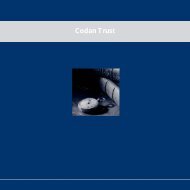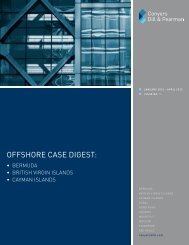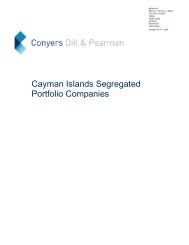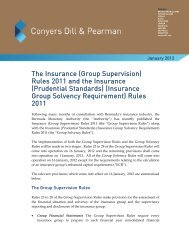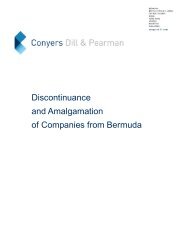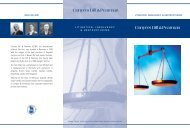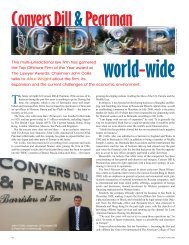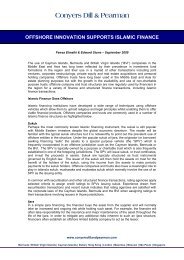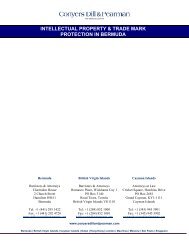OFFSHORE CASE DIGEST: - Conyers Dill & Pearman
OFFSHORE CASE DIGEST: - Conyers Dill & Pearman
OFFSHORE CASE DIGEST: - Conyers Dill & Pearman
You also want an ePaper? Increase the reach of your titles
YUMPU automatically turns print PDFs into web optimized ePapers that Google loves.
CAYMAN ISLANDSto set aside. In this case, the Plaintiff had, by its blatant andcontinuous breaches of the rules of the Grand Court shownwhat could only be described as a contemptuous disregard forthe Court’s practice and procedure. The Plaintiff failed to fileany substantive evidence which either carries some degreeof conviction or demonstrates a real likelihood that its draftdefence to the counterclaim could succeed. Given that thePlaintiff had conducted this part of the proceedings improperly,unreasonably and negligently, the application to set aside thejudgment was dismissed and costs were ordered against thePlaintiff on an indemnity basis.PROCEDURE – SECURITY FOR COSTS FOREIGNRECEIVER – STAYCigna Worldwide Insurance Company (by and through itsCourt appointed receiver, Josie Senesie, and in respectof the assets, undertakings and affairs of its licensedLiberian branch and business) v. Ace Limited, GrandCourt of the Cayman Islands Financial Services Division,Cause FSD 96 of 2011 (Originally Cause No. 39 of 2008),per Creswell J. (27 January 2012)Background: Cigna Worldwide Insurance Company is aDelaware insurance company with operations in variouscountries around the world. Ace, a Swiss insurer originallyincorporated in Cayman, acquired by agreement certainassets and assumed certain liabilities of Cigna’s property andcasualty business, including liabilities pertaining to Cigna’sLiberian business. Competing and conflicting judgments havebeen issued in the United States and in Liberia with respectto Cigna’s liability for certain policy claims from the time of theLiberian civil wars. Complex issues of sovereign immunity,conflicts of laws, enforcement of foreign judgments, discoveryand the legal status of foreign receivers are being considered invarious proceedings. Assorted stays and anti-suit orders havebeen issued. Against this backdrop, the Cayman action wascommenced by the Liberian court appointed receiver of whatis described as Cigna’s registered branch insurance businessin Liberia. In this action, the Plaintiff seeks recognition of hisappointment and indemnification for two judgments renderedby the Liberian Court in favour of the insureds. It is allegedin various proceedings that the receivership appointment isinvalid and the Plaintiff in fact acts at the behest of privateindividuals who had purchased the claims. This application isbrought by Ace for, inter alia, an order that the Plaintiff providesecurity for costs and for an order that the Cayman action bestayed pending the final determination of the proceedings, andany appeals therefrom, in the U.S. matters.Security for costs: It was uncontested that the Court hadjurisdiction to make an order for security for costs in thissituation, but the Plaintiff argued that the Court should notexercise its discretion to do so in this case on the basis ofinpecuniosity. The Court disagreed. A plaintiff who allegesthat an order for security for costs will stifle the claim mustadduce satisfactory evidence that the plaintiff does not havethe means to provide security and that the plaintiff cannotobtain appropriate assistance to do so from any third party whomight reasonably be expected to provide such assistance ifthey could. The affidavit evidence provided by the Plaintiff inthis case was not satisfactory, as it did not set out the groundsof the affiant’s statement of information or belief. As such, itwas appropriate to make an order for security for costs. Indetermining the amount of security, the court must take intoaccount the amount the respondent is likely to be able to raise.The court should not normally make a continuation of theclaim dependent upon a condition which it is impossible for therespondent to fulfil. Where a respondent opposes the makingof an order for security or seeks to limit the amount of securityby reason of impecuniosity, the onus is on the respondent toput proper and sufficient evidence before the court, and makefull and frank disclosure. If the respondent gives an incompleteor misleading account of its resources, the court may, inexercising its discretion, set an amount which represents theCourt’s best estimate of what the respondent can afford. In thiscase, the Court considered that the Plaintiff had not made fulland frank disclosure, nor had he given anything approachinga complete account to the Court. Given the complexity ofthe issues, the length of time required to hear them, and theconyersdill.com • 20





